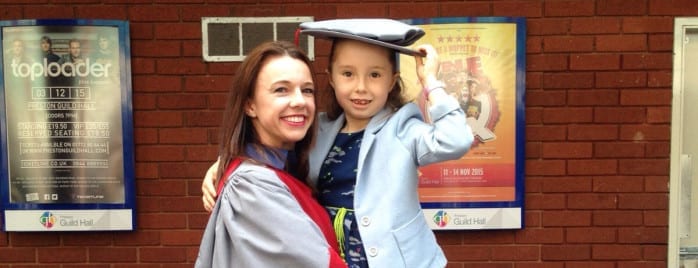July 17, 2015
A PSS Graduation: Family Impact practitioner Lorna Brookes gets her PHD
Liverpool and many other cities up and down the country are buzzing with graduates this week as students hard work finally pays off. Here at PSS we’re very proud of our own graduate, Lorna Brookes, who’s completed her PHD after 3 years of hard work and research all while working for the PSS Family Impact service. She told us a little bit about her research and what it’s brought to her work at PSS:
“In 2011 was offered a studentship through the School of Health to study for a full time PhD. As the general subject area was to study vulnerable children so it made perfect sense to take the opportunity to take an in-depth look at the service we offer to prisoners’ children and their families at PSS. This was a full time PhD (3 years). 2011-2014 which i completed whilst simultaneously working at PSS.
My overall aim was to better understand how families affected by parental imprisonment experience support. I wanted to know how they experienced support at PSS, but also how they experienced support in general (from other services they might be in contact with external to PSS, or any support they might get within their community, from family and friends). This was a qualitative study where each participant was given the opportunity to tell their story in detail; prisoners’ children, parents who had been in prison, and community-based parent/carers for children of prisoners were all interviewed.
The title of my research was “Bubbles, Brick Walls and Connectivity. Families affected by parental imprisonment and their experiences of community-based support”.
Participants spoke of feeling isolated and marginalized from society which some conceptualised like ‘being in a bubble’. One child said it was like living in a bubble because people could see her but they didn’t really see her clearly. The bubble of isolation was also provided as a meataphor to describe the environment that these families find themselves in; non-protective, vulnerable to breaking. Participants also described the ‘brick walls’ they experienced which reflected their immense frustrations of being judged and their lack of access to information which affects them. Banging heads against ‘brick walls’ was a commonly used metaphor to describe conflict with statutory services, and conflict with members of their communities and members of their own families. Many stories were told of abuse. The children of prisoners and the non-imprisoned family members told harrowing stories of the physical and mental abuse they had suffered as a result of a crime they themselves had not committed.
The majority of participants interviewed felt that PSS was their only option for support; one woman said “there is no-where else is there!”
The research found that PSS provides excellent support to families affected by parental imprisonment, predominantly because we help our service users to form and maintain meaningful relationships, which in turn helps them to better cope. This is described in the thesis as ‘Personal Connectivity’. The value of the relationships that are built with PSS staff members was spoken of highly, mainly due to the non-judgemental and empathic approach that staff adopt. The value of peers support groups, and the strengthening of relationships within the families by providing opportunities for safe family contact was also highlighted by participants as essential to their coping. Many participants also spoke of their personal growth they had experienced since coming to PSS (becoming peer mentors, helping others, finding a new a positive direction in their lives in spite of the hardship they had suffered).
Ultimately the research highlights that that our service is very much needed and that the focus on building positive relationships with service users and between service users is key. We have learnt that in the main our families was to ‘Be Heard’, ‘Be Safe’, ‘Be Informed’ and ‘Belong’.”
The picture is of Lorna and her daughter Matilda who has, as Lorna puts it: as ‘Endured the struggles of the research process along with me, and deserve the praise of surviving it as much as anyone!” In that case, congratulations to both Lorna and Matilda from everyone at PSS!

